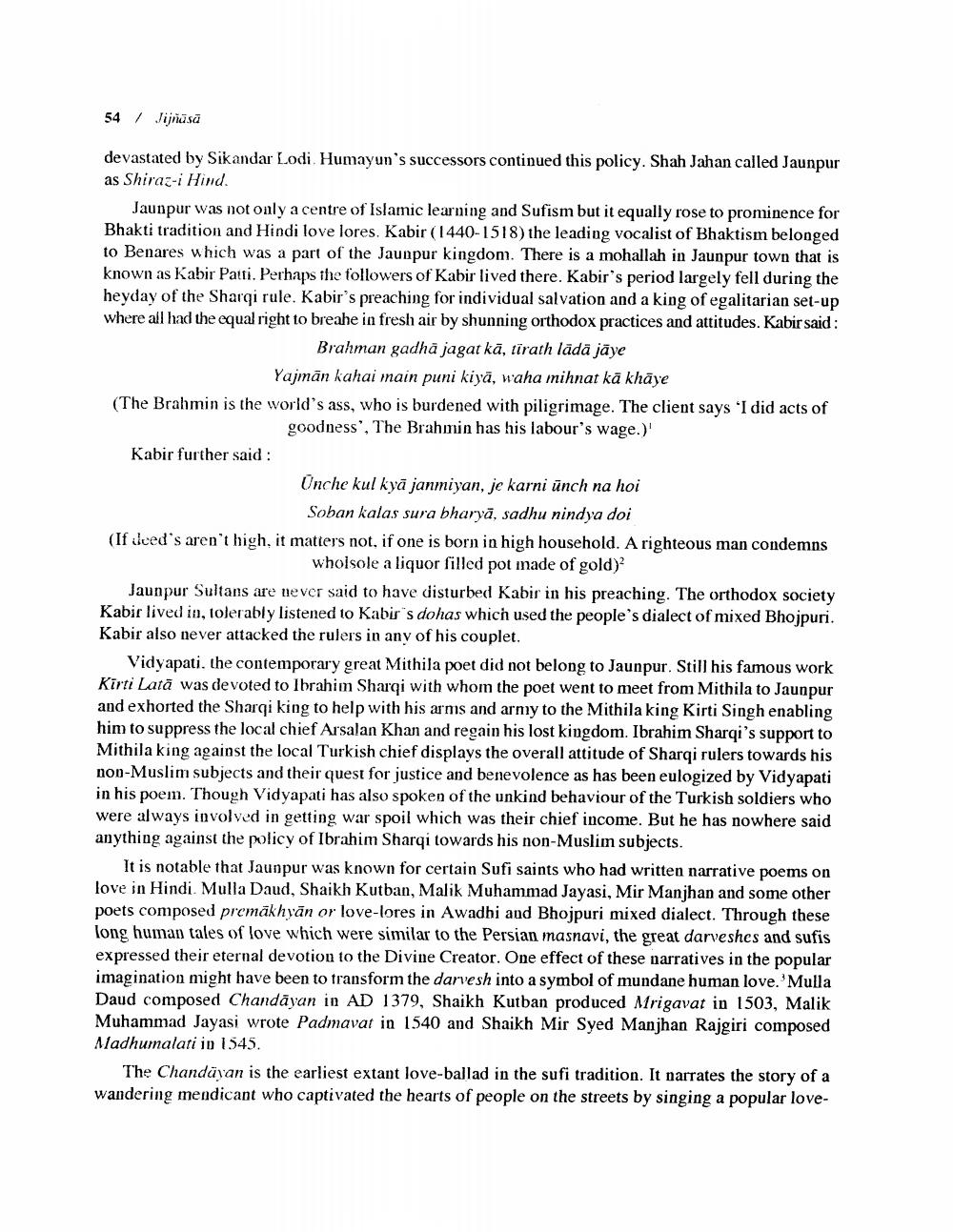________________
54/ Jijñāsā
devastated by Sikandar Lodi. Humayun's successors continued this policy. Shah Jahan called Jaunpur as Shiraz-i Hind.
Jaunpur was not only a centre of Islamic learning and Sufism but it equally rose to prominence for Bhakti tradition and Hindi love lores. Kabir (1440-1518) the leading vocalist of Bhaktism belonged to Benares which was a part of the Jaunpur kingdom. There is a mohallah in Jaunpur town that is known as Kabir Patti. Perhaps the followers of Kabir lived there. Kabir's period largely fell during the heyday of the Sharqi rule. Kabir's preaching for individual salvation and a king of egalitarian set-up where all had the equal right to breahe in fresh air by shunning orthodox practices and attitudes. Kabir said: Brahman gadha jagat kā, tīrath lādā jāye
Yajmän kahai main puni kiya, waha mihnat kā khāye
(The Brahmin is the world's ass, who is burdened with piligrimage. The client says 'I did acts of goodness', The Brahmin has his labour's wage.)'
Kabir further said:
Unche kul kya janmiyan, je karni unch na hoi Soban kalas sura bharya, sadhu nindya doi
(If deed's aren't high, it matters not, if one is born in high household. A righteous man condemns wholsole a liquor filled pot made of gold)
Jaunpur Sultans are never said to have disturbed Kabir in his preaching. The orthodox society Kabir lived in, tolerably listened to Kabir's dohas which used the people's dialect of mixed Bhojpuri. Kabir also never attacked the rulers in any of his couplet.
Vidyapati. the contemporary great Mithila poet did not belong to Jaunpur. Still his famous work Kirti Lata was devoted to Ibrahim Sharqi with whom the poet went to meet from Mithila to Jaunpur and exhorted the Sharqi king to help with his arms and army to the Mithila king Kirti Singh enabling him to suppress the local chief Arsalan Khan and regain his lost kingdom. Ibrahim Sharqi's support to Mithila king against the local Turkish chief displays the overall attitude of Sharqi rulers towards his non-Muslim subjects and their quest for justice and benevolence as has been eulogized by Vidyapati in his poem. Though Vidyapati has also spoken of the unkind behaviour of the Turkish soldiers who were always involved in getting war spoil which was their chief income. But he has nowhere said anything against the policy of Ibrahim Sharqi towards his non-Muslim subjects.
It is notable that Jaunpur was known for certain Sufi saints who had written narrative poems on love in Hindi. Mulla Daud, Shaikh Kutban, Malik Muhammad Jayasi, Mir Manjhan and some other poets composed premakhyān or love-lores in Awadhi and Bhojpuri mixed dialect. Through these long human tales of love which were similar to the Persian masnavi, the great darveshes and sufis expressed their eternal devotion to the Divine Creator. One effect of these narratives in the popular imagination might have been to transform the darvesh into a symbol of mundane human love. 'Mulla Daud composed Chandayan in AD 1379, Shaikh Kutban produced Mrigavat in 1503, Malik Muhammad Jayasi wrote Padmavat in 1540 and Shaikh Mir Syed Manjhan Rajgiri composed Madhumalati in 1545.
The Chandayan is the earliest extant love-ballad in the sufi tradition. It narrates the story of a wandering mendicant who captivated the hearts of people on the streets by singing a popular love




